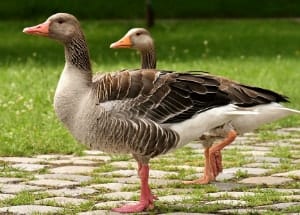If you live in a suburban area, you probably face the need to drive geese from your site. The absence of natural predators and proximity to food sources contribute to an increase in their numbers. They can damage your plants and residential property and pose a severe threat to you and your pet’s safety and health.
In this article, I will tell you about the humane and legal geese control methods. It is important to know what has attracted them to your territory and use several ways at once. Also, in this guide, I’ve included an overview of products that will help you keep geese out of your yard and prevent them from reappearing.
[wpsm_titlebox title=”How to Get Rid of Geese In Your Yard and Pond” style=”main”]
- Find ways for birds to get into your area.
- Eliminate the food source.
- Keep your grass long.
- Install fences, nets, and walls.
- Install stuffed animals and dummies in the form of birds of prey and raptors.
- Buy sonic repellents.
- Treat your yard with natural repellents.
[/wpsm_titlebox]
Learn What You Are Dealing With: Geese Identification
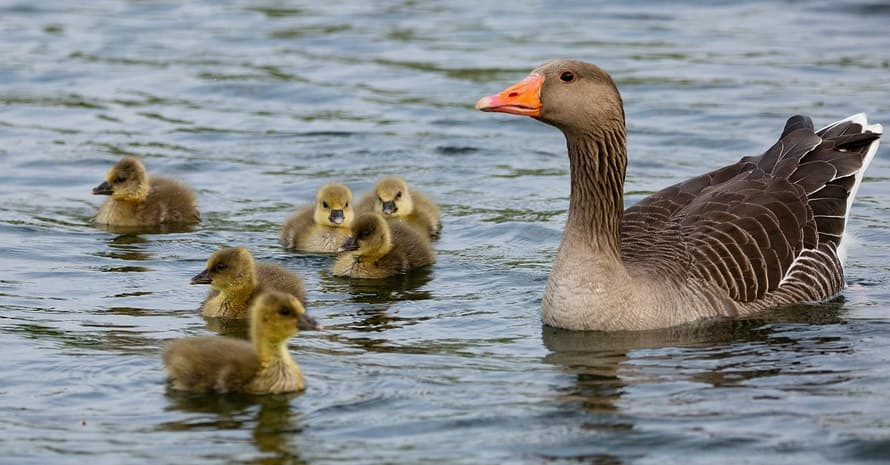
There are many different species of geese living in the United States and North America in general. The following three main groups of these birds are the most common near human habitation:
- Canada geese. They have shiny black necks and heads with white cheeks; chests and wings are brown, lower parts of their bellies are white, bills and legs are black. Some individuals can grow up to 15 lbs and up to 43 inches long.
- Snow geese. These birds are white with black wingtips. Their legs and bills are pink. These geese are small, about 30 inches long, and weighing about 9 lbs.
- Ross’s geese. They are similar in many ways to snow geese but much smaller in size. These birds are white with black wingtips, have red bills and legs. Their weight does not exceed 3.5 lbs, and the body length is not more than 25 inches.
All types of geese have certain benefits and negative impacts on different areas of human society.

Geese lifecycle
Many characteristics vary from species to species, but most geese reach sexual maturity by the age of two and begin looking for a mate. The breeding season usually falls in late spring-early summer. Geese often build nests near bodies of water and a food source.
It takes a gosling from one to two months to get stronger and start flying. However, even after that, they can be under the care of their parents until puberty. Most species of geese are migratory birds. They nest in the north during the summer months and fly to the south for the winter.
What attracts geese to your property?
If geese appear in your garden, it means that they feel safe and have access to food and water there. Many species are accustomed to living next to people and are not afraid of them. If you don’t deter geese from your property in time, they can build a nest somewhere nearby. And then getting rid of them will be even more complicated.
What problems do geese cause?
At the moment, scientists know more than 60 diseases transmitted from birds to humans; some of them are even fatal. That is why it is better to avoid contact with geese and the remains of their vital activity. Apart from health problems, you can get damaged property.
By trampling down the lawns, geese damage sports and golf fields. They can also leave up to 1 lb of droppings daily. It leaves stains and can even degrade building materials. It costs a lot of money to clean it up and cope with the consequences. A lot of geese feces in water bodies can also disrupt the local ecosystem.
How to Get Rid of Geese: a Comprehensive Manual
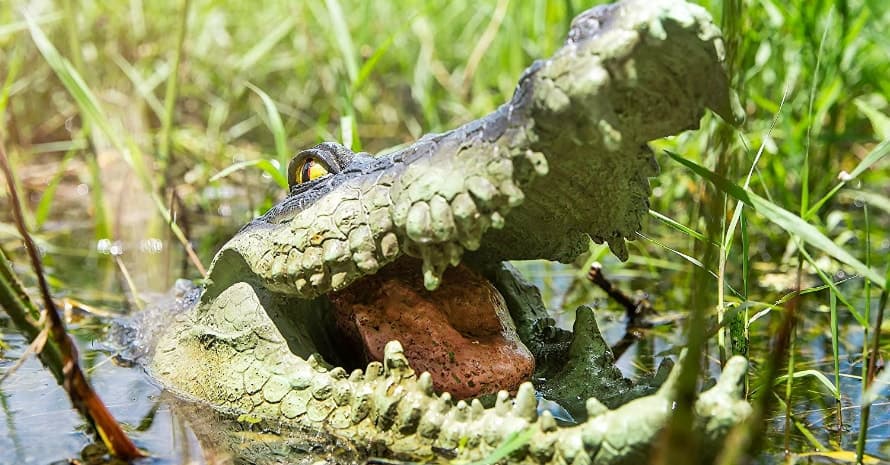
Since geese are quite intelligent creatures, it is not so easy to get rid of them. Therefore, you need a step-by-step plan to make your site unsightly for these birds.
In preparation for dealing with them, explore your yard and surrounding area to find the paths the birds take to get into your area, and understand how to make geese go away most effectively. Based on this, develop a plan of action using several methods. Monitor their effectiveness, and adjust if needed.
Remember that nature conservation acts and laws protect geese. In my guide, I have included the most humane techniques for which you don’t need to get a permit.
Step 1: Eliminate the food source
Your very first action should be a restriction of access to food. I mean not only food that remains after people, bird feeders and so on. Scattered grains of wheat or oats after harvest can surely attract the attention of flying geese. These birds can pluck freshly planted lawns or young sprouts of flowers and other plants. And do not feed geese. They can become aggressive and demanding if not fed in time.
Step 2: Keep your grass long
As I already wrote, geese prefer young grass and fresh plant sprouts. If possible, let the grass grow a little so that these birds stop coming back to you. Grass longer than 10-15 inches will make your site inconvenient for their habitat.
Alternatively, you can sow grass that is not attractive to geese, such as fescue. Try to fertilize your lawn as little as possible to reduce its nutritional value.
Step 3: Get rid of geese
It is almost impossible to eliminate the appearance of geese on the site, so you need to make it unsuitable for regular use and nesting. The methods and means described below are humane, safe for people, and livestock. Remember that it is better to choose an integrated approach and apply several methods at once.
For example, repellents will make geese stop eating the lawn, but will not prevent them from walking on it, so it is worth installing dummies.
Fencing
Physical obstacles such as fences, nets, and walls will not stop birds from flying into your area, but they will prevent geese from entering your territory. If there is a water source near you, surround it with a fence to stop waterfowl from coming ashore.
Such obstacles do their job especially well during the molting season in summer when geese cannot fly and have to walk in search of food.
Visual deterrents
Such devices include scarecrows and dummies in the form of birds of prey and predators. I recommend choosing products with hinges or springs.
If figures move in the wind, the geese will think they are alive. Also, look out for reflective tapes, balloons, and flags. Birds generally prefer not to be near waving objects. For night time, you can use lighting with a motion sensor.
Sound deterrents
Sonic deterrents and noisemakers reproduce the cries of birds of prey that geese fear and loud noises such as gunshots or explosions. These devices are useful but may be too loud to be used in residential environments. There are also ultrasonic bird repellents.
Natural geese repellent for lawn
The entire yard can be processed with such liquid remedies. They contain natural ingredients that act as irritants, causing digestive discomfort in geese stomachs. After eating something bad, birds will remember this place and try to avoid it. Look for methyl anthranilate or anthraquinone in such repellents.
How to prevent geese in the future?
Fighting geese is really difficult and time-consuming. Swap scarecrows and other visual deterrents from time to time to keep birds from getting used to their location. Treat your lawn with repellents regularly. If you don’t know how to keep geese away from the pond, use the same methods.
Also, plant tall grass or thorny bushes on the bank, which will prevent geese from going ashore. If possible, get a border collie or other hunting dog. If you find a goose nest on your site, do not try to destroy it and call specialists immediately.
Top 3 Geese Treatments
Now that you already know everything about waterfowl’s behavior and how to stop geese from pooping in yard, I will tell you about three of the most effective products for controlling these pests.
1. Bird Blinder Repellent PinWheels — Garden Pinwheels to Scare Geese off Lawn
[amazon box=”B078X1JXV1″ template=”vertical” tracking_id=”how-to-get-rid-of-geese-20″ button_text=”Check price on Amazon”]
Specifications:
- Humanely
- Material: Mylar
- Number Of Pieces: 8
- Item Weight: 13.7 ounces
- Product Dimensions: 17.52 x 9.25 x 3.78 inches
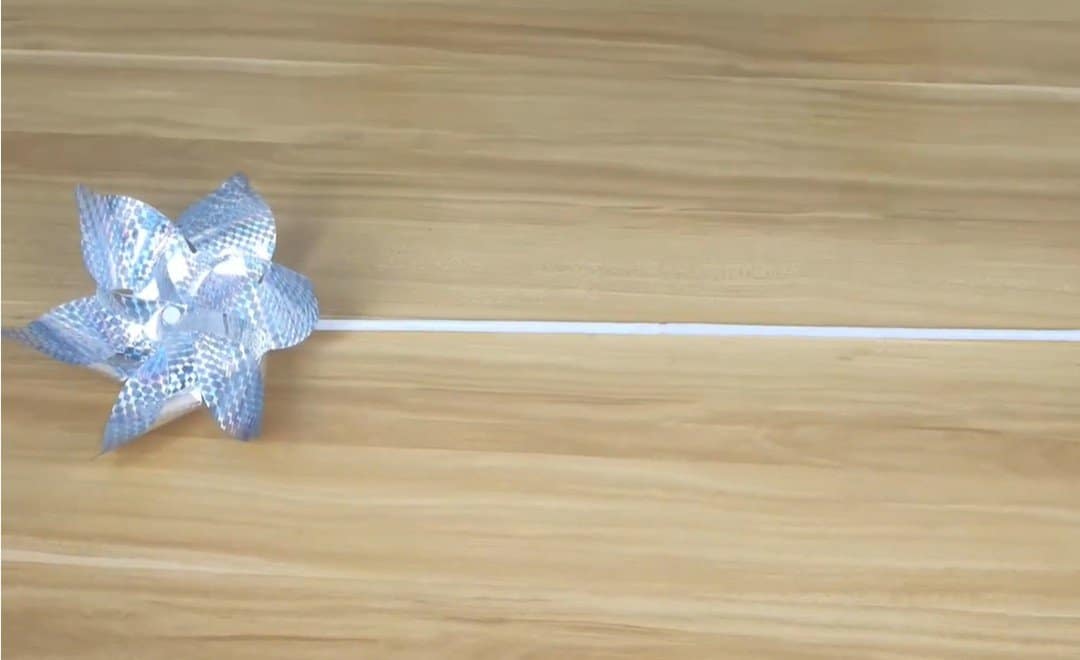
Moving shiny objects reflect light and scare birds away with constant blinking. The Bird Blinder Repellent PinWheels package contains eight items (each 19 inches tall and 7 inches wide) made of mylar tape. This set is perfect for small yards. Arrange the pinwheels in an open area free from bushes and trees for direct sunlight. In the wind, they shine brightly and rustle slightly, irritating geese vision and hearing.
| Pros: | Cons: |
|
|
2. Flambeau Outdoors Coyote Decoy — The Best Way to Get Rid of Canadian Geese
[amazon box=”B001HRXUN4″ template=”vertical” tracking_id=”how-to-get-rid-of-geese-20″ button_text=”Check price on Amazon”]
Specifications:
- Material: Ultra-Sturdy Hard Plastic
- Item Weight: 0.45 Pounds
- Fully Assembled Size: 30″ L x 9″ W x 25″ H
- Package Dimensions: 30.5 x 12.25 x 9.5 inches
- Includes: faux fur tail with a wire backbone, a scent pad spike on the rear leg, ears
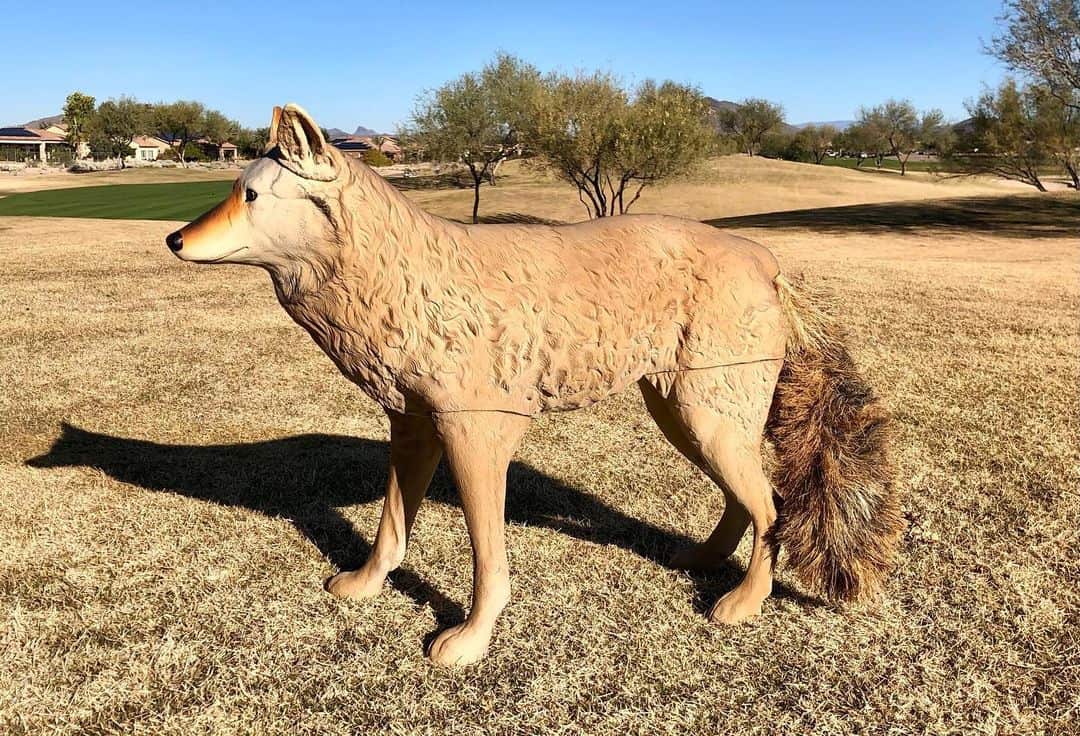
Realistic figures of predators can be an excellent measure to protect your site from geese. Flambeau Outdoors Coyote Decoy is made of durable plastic, has adjustable legs and ears, a scent pad spike, and a faux fur tail that mimics real animal fur. It is easy to assemble and set in a resting, standing, or sitting position. The figure is 25 inches high and weighs 7.2 ounces.
| Pros: | Cons: |
|
|
3. Homarden Floating Crocodile Head Decoy — Scare Geese off Your Pond
[amazon box=”B086KRKF4V” template=”vertical” tracking_id=”how-to-get-rid-of-geese-20″ button_text=”Check price on Amazon”]
Specifications:
- Premium Material
- Product Dimensions: 13 x 5.75 x 5.75 inches
- Package Dimensions L x W x H: 13.74 x 8.66 x 8.15 inches
- Target pests: Goose, Predator, Heron, Duck
If you have a pond or lake on or near your property, geese can be a real problem. Scare them away with the Homarden Floating Crocodile Head Decoy. It is made of lightweight foam that does not sink and floats from the wind and water flows, creating the effect of a real animal’s movement. The figure measures 13x6x3 inches and is decorated like a real crocodile. The paint is resistant to direct sunlight and does not fade over time.
| Pros: | Cons: |
|
|
FAQs on How to Get Rid of Geese on Lake and Yard
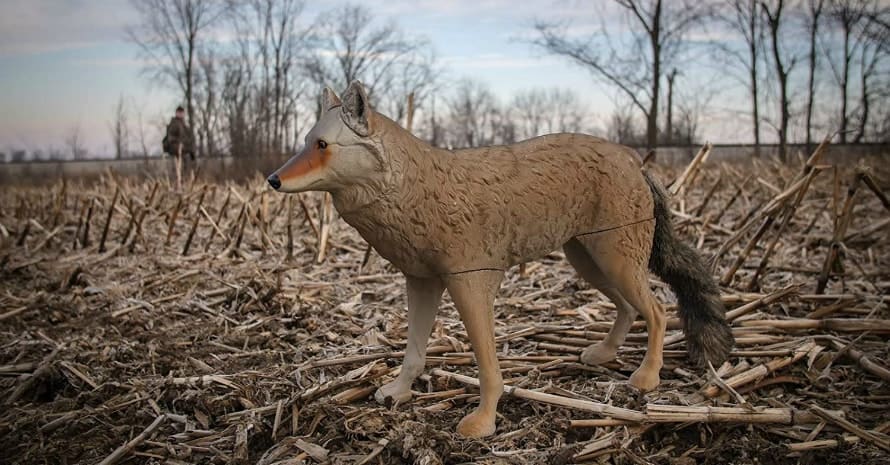
In this section, I will answer the most frequently asked questions about geese and how to control them. If, after reading it, something remains unclear to you, feel free to ask your questions in the comments section.
What do Canadian geese eat?
All types of geese are herbivores, although small fish and insects can be included in the diet of Canada geese. But they mainly eat grass, grains, beans, and algae. Due to their long-term living next to people, these birds have adapted to steal food from garbage cans or begging for it in parks. However, human food is extremely harmful to their bodies.
Are Canadian geese protected?
Yes. A special permit to capture or kill these birds and destroy their nests and eggs is required by law. Such permission is granted only if, in the opinion of the authorities, other methods have proved to be ineffective.
So to get rid of Canadian geese on your property, you only have to use bird deterrent techniques. Any physical harm is considered illegal and punishable by law.
Does a coyote statue scare geese?
As with any predator props, coyote statues will be effective in regions where geese have encountered coyotes in the wild and know they are dangerous. If resident geese that do not fly to other countries for the winter live next to you, they are unlikely to be afraid of any plastic figure. In any case, this should be considered a temporary measure, as the birds quickly get used to them.
How often do I need to scare geese?
You have to do it frequently (several times a day) so that geese have a negative experience from staying on your site. Even if you have scared away one group, after a while, another may arrive. To stop birds from living on your property, you need to start using deterrent methods early, before a nesting season.

Keeping Geese Out of Your Yard Effectively
For some property owners, geese can become a real problem. I hope my guide and review will help you solve this problem. Remember, effective pest control requires an integrated approach. Besides, geese quickly adapt to their surroundings, which means that you will have to change tactics from time to time.
I also recommend that those who have already encountered this problem start preparing in advance, before the birds` nesting (late winter-early spring). If your neighbors experience the same bird issues as you, join forces to fight them more effectively.
Tell me, have you encountered the geese problem? What methods have been effective in your case?
References:
- Positive Benefits and Negative Impacts of Canada Geese (Rutgers Cooperative): https://www.nrcs.usda.gov/Internet/FSE_DOCUMENTS/nrcs141p2_018050.pdf
- Geese feces health risks? (Go Ask Alice):
https://goaskalice.columbia.edu/answered-questions/geese-feces-health-risks - Controlling Conflicts with Resident Canada Geese in Maryland (Maryland Department of Natural Resources):
https://dnr.maryland.gov/wildlife/Pages/plants_wildlife/ResGeeseProblem.aspx - When Geese Become a Problem(New York State Department of Environmental Conservation
Division of Fish):
https://www.dec.ny.gov/docs/wildlife_pdf/geese.pdf

